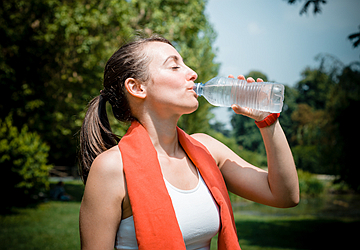Beautiful, radiant skin is a coveted asset, and many of us scour beauty aisles and listen intently to dermatologists for tips to achieve that flawless look. One aspect that repeatedly emerges in discussions about skin health is the importance of staying hydrated. Indeed, the connection between hydration for skin health and achieving a clear complexion is profound and backed by science.
When we think of hydration, the immediate association is with drinking water. While water intake is vital for overall health and skin, hydration for skin health is a multifaceted concept. It's not just about how much water you drink but also about retaining that moisture in the skin.
Skin cells, like any other cells in the body, are made up of water. Without adequate water, they fail to function at their best. This could lead to dry, flaky skin, reduced elasticity, and a lack of that coveted glow. By drinking sufficient water and ensuring we have a proper skincare routine in place, we can lock in the necessary hydration to keep our skin looking its best.

The human body comprises about 60% water. Every system and every cell relies on water to function correctly. So, it's no surprise that there are myriad drinking water benefits that go beyond just satisfying our thirst.
Flushes out Toxins: Drinking water helps in detoxifying the body by promoting kidney function and ensuring regular bowel movements. Water aids in flushing out toxins, which in turn can lead to clearer skin.
Boosts Blood Flow: Adequate hydration supports healthy blood circulation. This ensures that essential nutrients reach skin cells, giving a healthier, more radiant appearance.
Supports Skin Elasticity: Dehydration can make skin look dull and saggy. Drinking enough water helps maintain skin's elasticity, reducing the appearance of fine lines and wrinkles.
For those seeking a blemish-free and glowing complexion, here are some clear skin tips grounded in the principle of hydration:
Consistent Water Intake: Aim to drink at least eight glasses of water a day. This ensures the skin remains hydrated from within.
Use a Humidifier: If you live in a dry environment or during winter months, using a humidifier can introduce moisture into the air, preventing the skin from drying out.
Opt for Hydrating Skincare Products: Look for skincare products that promote hydration. Ingredients like hyaluronic acid can help retain the skin's natural moisture.
Limit Caffeine and Alcohol: Both can be dehydrating. If you do indulge, ensure you’re drinking additional water to compensate.
Dietary hydration: Include items high in fluids in your everyday meals, like fruits and vegetables. These foods not only hydrate you but also give you both antioxidants and vitamins your skin needs to stay healthier.
To truly understand the significance of hydration, one needs to look at dehydration skin effects. Dehydrated skin is more than just dry. It can appear dull, show fine lines more prominently, and may even become more prone to inflammation and redness.
Increased Sensitivity: Dehydrated skin often becomes more sensitive, making it susceptible to irritants.
Uneven Texture: A lack of hydration can lead to an uneven skin texture, including dry patches.
Accentuated Wrinkles: Dehydrated skin can make fine lines and wrinkles appear deeper and more prominent.
While water plays an undeniable role in skin health, the balance of electrolytes in our body is equally essential. Electrolytes, such as sodium, potassium, and calcium, not only aid in hydration but also play a role in cell turnover, vital for skin health.
● Balanced Diet: Incorporating foods rich in these minerals can provide the electrolytes needed to maintain optimal hydration levels. Foods like bananas, avocados, and leafy greens are great options.
● Skincare Products: Some advanced skin care products now contain trace minerals that can help restore the skin's natural barrier.

Nature provides a plethora of ingredients that can help hydrate the skin and boost its natural glow. Some of these ingredients include:
● Aloe Vera: Known for its soothing properties, aloe vera also provides deep hydration, which is especially beneficial for sunburned or irritated skin.
● Honey: This natural humectant draws moisture from the air into the skin, ensuring it stays moisturized and supple.
● Glycerin: Often found in skincare products, glycerin helps retain moisture, giving the skin a youthful appearance.
Essential fatty acids, especially omega-3 and omega-6, play a significant role in maintaining the skin's lipid barrier, which is crucial for locking in moisture.
● Fish and Flaxseeds: Rich in omega-3, these foods can enhance the skin's ability to retain water.
● Evening Primrose Oil: High in omega-6, it can be beneficial for those with dry or sensitive skin conditions.
Not all water is created equal. The water we drink and use externally can influence our skin's health.
● Hard Water: Often high in minerals, hard water can leave a residue on the skin, which might lead to dryness or irritation. Investing in a water softener or using chelating shampoos can be helpful.
● Drinking Filtered Water: To ensure you're getting the purest water possible, consider using a filter to remove any contaminants or impurities.
Our skin has a natural barrier designed to keep harmful elements out and lock in moisture. Here’s how to support it:
● Avoid Over-exfoliation: Overdoing it with exfoliation can strip the skin of its natural oils, leading to dehydration.
● Barrier-boosting Products: Look for products with ceramides and niacinamide, which can help restore and reinforce the skin's natural barrier.
The journey to radiant, clear skin is deeply interlinked with hydration. From understanding the broader drinking water benefits to implementing specific, clear skin tips, maintaining hydration both inside and out is pivotal. Remember to keep an eye on dehydration skin effects to catch any early signs and to ensure that you're providing your skin with the best care possible. The next time you reach for a glass of water, remind yourself of the myriad benefits and the lustrous skin that awaits.